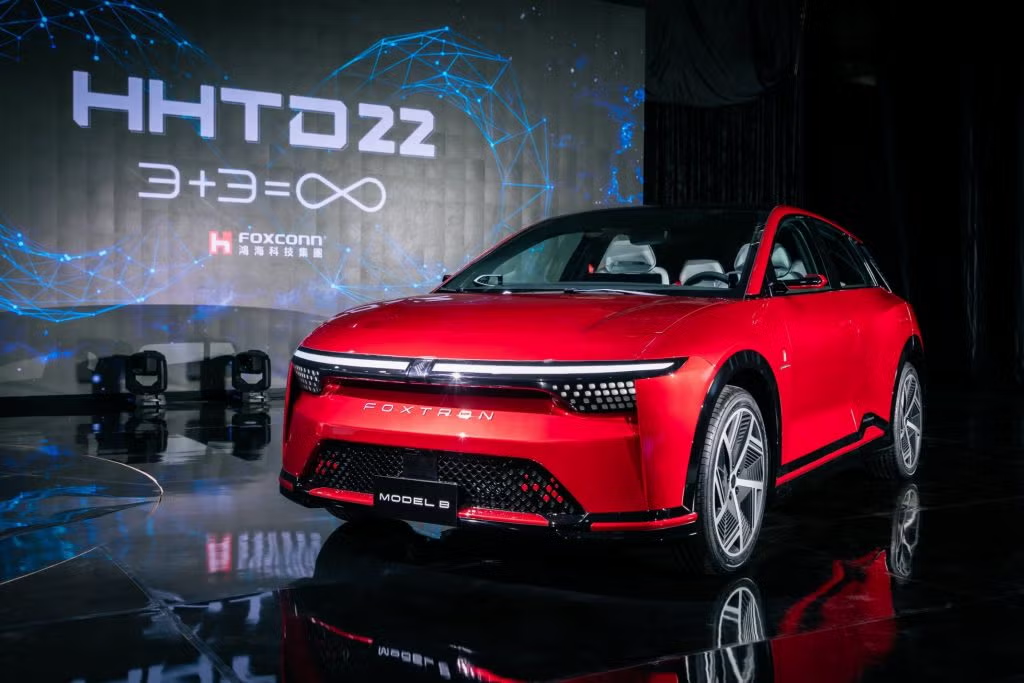April 28, 2025 —
In a major move that could reshape the global electric vehicle (EV) landscape, Foxconn and Nissan are in talks with Saudi Arabia’s powerful Public Investment Fund (PIF) to build a new EV manufacturing center. This ambitious collaboration reflects Saudi Arabia’s drive to become a global leader in clean energy and advanced technology industries.
Nissan Looks for Fresh Opportunities
Nissan, one of Japan’s top automakers, has been actively seeking new strategies to recover from recent financial challenges. While earlier reports hinted that Nissan might team up with Honda for EV production, new information suggests that Nissan is shifting focus towards Saudi Arabia instead. The company is now looking to work closely with PIF, signaling a strong commitment to explore fresh growth markets outside of Japan.

If finalized, this partnership would not just help Nissan expand its global EV footprint, but also allow the automaker to tap into the Middle East’s rapidly growing appetite for electric mobility.
Foxconn’s Expanding Role in the EV World
Foxconn, a Taiwanese manufacturing giant best known for assembling Apple’s iPhones, has been making bold moves into the EV sector over the past few years. Instead of becoming a car brand itself, Foxconn is focusing on being a trusted partner for major automakers by offering cutting-edge manufacturing and technology services.
Sources close to the talks reveal that Foxconn is positioning itself as a Tier 1 supplier to Nissan in Saudi Arabia. This means Foxconn would handle a large part of the production and supply chain work, allowing Nissan to focus more on design, marketing, and branding. Importantly, Foxconn is not looking to own or control Nissan’s operations — rather, it wants to be a key player behind the scenes, enabling faster and more efficient EV production.
Saudi Arabia’s Vision 2030: Driving a New Economy
At the heart of this potential partnership is Saudi Arabia’s sweeping Vision 2030 plan. This national strategy, championed by Crown Prince Mohammed bin Salman, is designed to reduce the Kingdom’s dependence on oil by building a more diverse, sustainable economy.
Electric vehicles play a crucial role in this vision. Saudi Arabia’s PIF has already invested heavily in EV projects, including taking a majority stake in Lucid Motors, a premium EV maker from the United States. The country has also launched Ceer Motors, its very own electric car brand, in collaboration with Foxconn. Ceer plans to design, manufacture, and sell a full range of EV sedans and SUVs specifically tailored for the Middle East and beyond.
By working with established names like Nissan and Foxconn, Saudi Arabia hopes to speed up its industrial transformation, create thousands of new jobs, and position itself as a serious competitor in the global EV race.
What the Future Partnership Could Look Like
If Nissan’s talks with PIF succeed, the partnership could bring massive benefits for all sides. Saudi Arabia would gain valuable know-how from one of the world’s top carmakers. Nissan would get a cost-effective production hub closer to emerging markets in Africa, Asia, and Europe. Foxconn would strengthen its role as a leading EV manufacturer without needing to build its own car brands.
In this model, Foxconn could help Nissan by providing everything from vehicle chassis to advanced electronics, while Nissan would maintain control over car designs and customer relationships. Saudi Arabia, meanwhile, would offer land, funding, and logistical support to make sure the new EV factories run smoothly.
A Changing Global EV Market
This news comes at a time when the global EV industry is changing rapidly. Chinese carmakers are quickly gaining ground worldwide, while EV sales in North America and Europe are slowing due to high prices and economic uncertainty. Many smaller EV startups have struggled to stay afloat, with several either shutting down or merging with bigger players.
As the market becomes tougher, partnerships like the one between Nissan, Foxconn, and Saudi Arabia could become even more important. Rather than going it alone, companies are finding strength in strategic alliances that combine manufacturing power, financial backing, and technological expertise.
Why Saudi Arabia Matters
Saudi Arabia’s geographic position gives it easy access to Europe, Africa, and Asia — three of the most important EV markets in the next decade. The country is also investing heavily in renewable energy projects like solar and wind, ensuring that its future EV production will be powered by clean energy sources.
Moreover, by building its own EV industry from the ground up, Saudi Arabia hopes to not only sell cars but also develop local expertise in software, battery technologies, and autonomous driving systems.
For Nissan, partnering with Saudi Arabia could be a smart move to strengthen its competitiveness against rivals like Tesla, BYD, and Volkswagen in the global EV arena. For Foxconn, it’s another step toward becoming the “Android of EV manufacturing” — a company that quietly powers many brands without directly competing against them.
Final Thoughts
The possible alliance between Nissan, Foxconn, and Saudi Arabia’s Public Investment Fund is more than just another business deal. It could be a blueprint for the future of the EV industry — one where collaboration, innovation, and global ambition drive success.
As talks continue and details emerge, the world will be watching closely to see whether this ambitious partnership can turn Saudi Arabia into a new powerhouse in the electric vehicle world.


